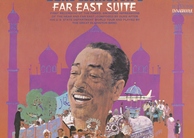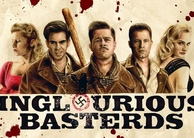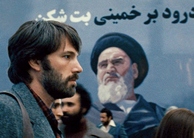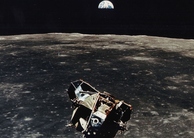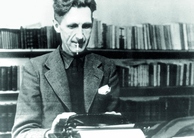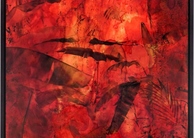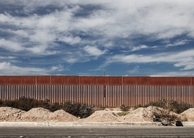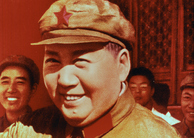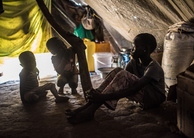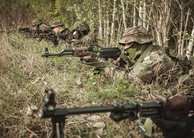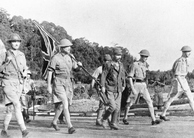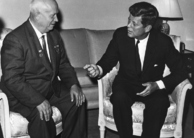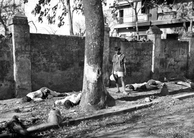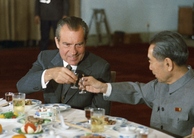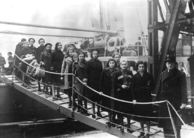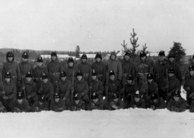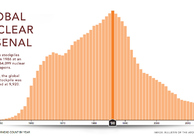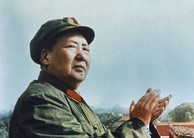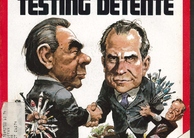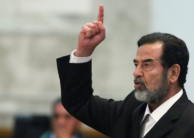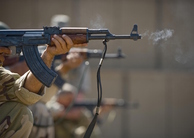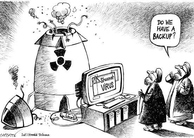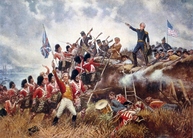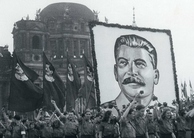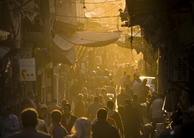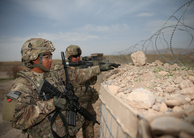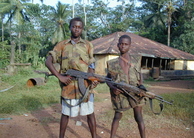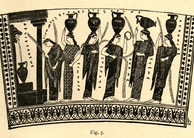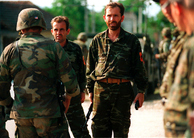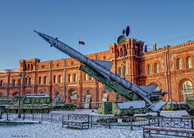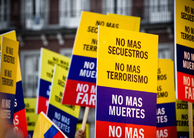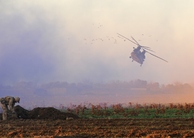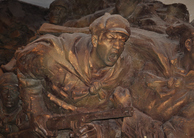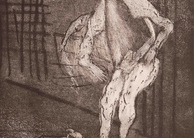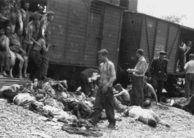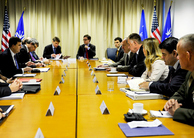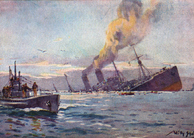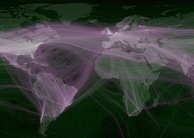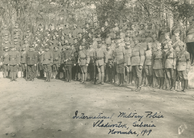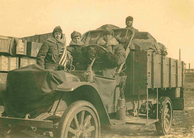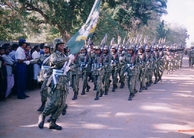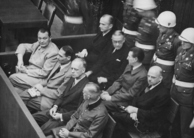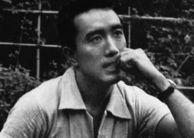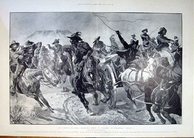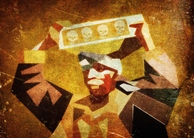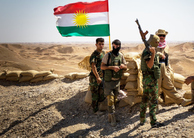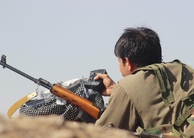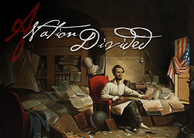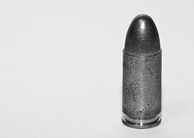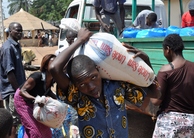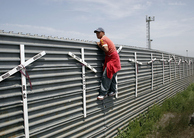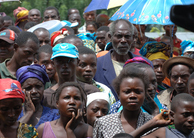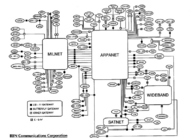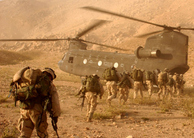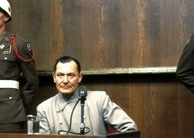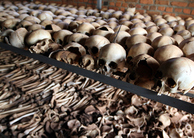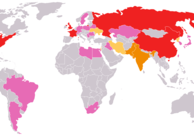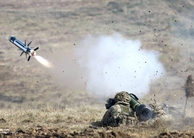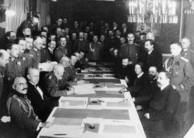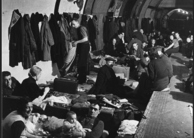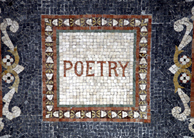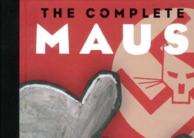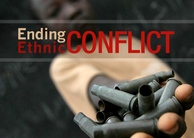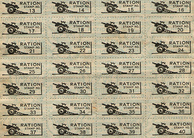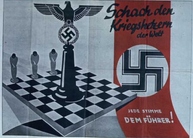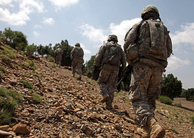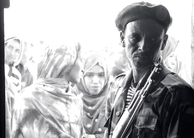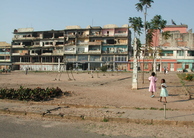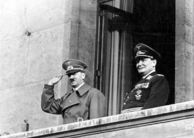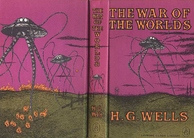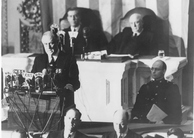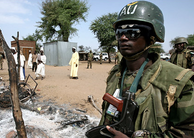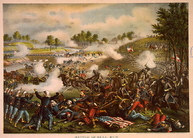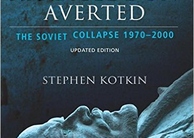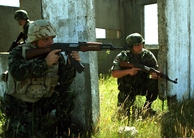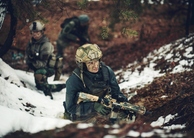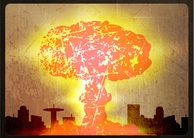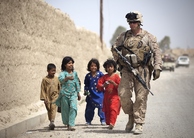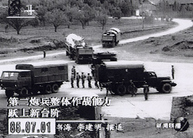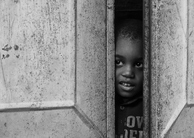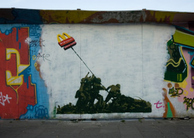|
War (tagged articles)
The keyword War is tagged in the following 172 articles.
2022, Vol. 14 No. 02
The causes of the First World War remains a historiographical topic of contention more than 100 years on from the start of the conflict. With the passing of the centenary in 2014, a new wave of publications has expanded the scope and depth of historians... Read Article »
2022, Vol. 14 No. 01
To explore the relationship between history education and attitudes to War, narrative primes about World War II were read by 20 undergraduate students at California State University, Fresno. After Wards, in the course of experimental interviews,... Read Article »
2021, Vol. 13 No. 11
The Sino-Vietnamese War remains one of the most peculiar military engagements during the Cold War. Conventional wisdom would hold that it was a proxy War in the vein of the United States’ War in Vietnam or the Soviet invasion of Afghanistan... Read Article »
2021, Vol. 13 No. 11
While the Cold War is popularly regarded as a War of ideological conflict, to consider it solely as such does the long-winded tension a great disservice. In actuality, the Cold War manifested itself in numerous areas of life, including the various... Read Article »
2021, Vol. 13 No. 11
This article analyzes the role of musical works in the United States during World War II. It chronologically examines how the social and therapeutic functions of music evolved due to the developments of the War. This article uses the lyrics of Wartime... Read Article »
2021, Vol. 13 No. 05
Some scholars of American history suggest the institution of slavery was dying out on the eve of the Civil War, implying the Civil War was fought over more generic, philosophical states' rights principles rather than slavery itself. Economic evidence... Read Article »
2021, Vol. 13 No. 05
During the height of the Cold War, the US State Department sponsored a series of racially integrated “Jazz Ambassador” tours in order to project proof of American talent and egalitarianism abroad. Representing and wielding the cultural... Read Article »
2021, Vol. 13 No. 02
This article explores the way in which Quentin Tarantino’s Inglorious Basterds challenges the myth of the American hero and criticizes the glorification of War cinema by satirizing the viewer directly. The particular focus is on the subtly... Read Article »
2021, Vol. 13 No. 01
The Civil War was a seminal moment in the historical development in the United States. The American Revolution may have created the U.S. as a sovereign nation, but the Civil War helped to determine what kind of nation America would become. The Reconstruction... Read Article »
2020, Vol. 12 No. 12
Oliver Stone's filmography has levied an unprecedented effect on the popular understanding of American history, especially of the turmoil surrounding the Vietnam War and the assassination of John F. Kennedy. His style has been described as highly... Read Article »
2020, Vol. 12 No. 11
“Just- War theory,” as it is called, aims to guide action during Warfare, so that states and individuals can act ethically. Because Warfare is often analogized to epidemics, this paper will argue that just- War theory can recommend how... Read Article »
2020, Vol. 12 No. 10
In this essay, I provide a content analysis of commercially and critically successful films that perpetuate popularized Islamophobia, which is often masked as irreconcilable religious and cultural difference although it has in fact been consistently... Read Article »
2020, Vol. 12 No. 09
The man who powered NASA through the Apollo Era had no background in science or engineering. Rather, NASA achieved one of history’s most thrilling tasks on an ambitious timeline in turbulent political conditions precisely because NASA Administrator... Read Article »
2020, Vol. 12 No. 02
In the opening of J. M. Richards’s post- War account of suburbia, The Castles on the Ground, the author's commentary is unusually sympathetic to a phenomenon that throughout the twentieth-century had either been critically neglected or judged... Read Article »
2019, Vol. 11 No. 12
Although the Vietnam War officially ended in 1975, the long-term effects of the toxic contaminant, dioxin, found in Agent Orange continues to be a large public health issue. Throughout this paper, the theoretical framework of slow violence will... Read Article »
2019, Vol. 11 No. 04
This paper explores the conflict between hegemonic and new masculinity in Phil Klay’s Redeployment, illustrating the changing conception of gender roles and masculinity in storytelling about War. This paper juxtaposes traditional conceptions... Read Article »
2019, Vol. 11 No. 01
Until the outbreak of civil War, the United States would continually try and fail to subdue the existential threat of slavery, with each attempt exacerbating the sectional tensions between slave and free states. In 1830, Massachusetts Senator Daniel... Read Article »
2018, Vol. 10 No. 05
This review discusses Mindfulness-Based Art Therapy research to date. A literature review first explores mindfulness and art therapy independently, then investigates the current research on the combination of these two modalities used with clients... Read Article »
2018, Vol. 10 No. 01
This paper analyzes the ongoing drug War being waged between Mexican drug trafficking organizations (DTOs), their rivals, and the U.S./Mexican governments. This analysis is conducted through the lens of drug control; namely, through an examination... Read Article »
2017, Vol. 9 No. 12
In 2010, over 250,000 Syrian farmers were forced from their land due to water shortages. Lack of water left these farmers dangerously food insecure, so they moved, en masse, into Syrian urban centers. This strained an already overburdened infrastructure... Read Article »
2017, Vol. 9 No. 12
Cooley (1902) introduced the looking glass self as an individual’s self-concept defined, in part, by societal heuristics. Silvia and Phillips (2013) showed self-a Wareness (SA) was influenced by presenting stimuli that both explicitly increase... Read Article »
2017, Vol. 9 No. 11
This article uses two decision-making theories – rational choice theory and prospect theory – to examine China’s resolution to intervene militarily in the Korean War. I argue that Chairman Mao Zedong was in a domain of loss both... Read Article »
2017, Vol. 9 No. 11
This research project focuses on invasive aquatic species and their potential usage as biological weapons. It’s a cross disciplinary study which utilises a comprehensive literature review on invasive aquatic species, biological Warfare, maritime... Read Article »
2017, Vol. 9 No. 11
South Sudan is the youngest and one of the most volatile nations in the world. After two decades of War, it gained its independence from Sudan in 2011. Peace, however, was short-lived. As oil prices plummeted and competition intensified, an ill-... Read Article »
2017, Vol. 10 No. 2
It is often thought that great military strategists do not engage in simple, frontal assaults, but instead devise complex plans meant to deceive, manipulate, and surprise their enemies. However, do such strategies always lead to victory? If not,... Read Article »
2017, Vol. 7 No. 2
Although terrorism has been present in the world for centuries, it is only since the 1980s that suicide terrorism has become an object of study for academics and an existing concern for government professionals. While discourses on suicide terrorism... Read Article »
2017, Vol. 9 No. 04
Since the end of the Second World War, scholars of British military history have busied themselves with attempts to explain the British defeat at Singapore to Japan in February 1942. Research reveals that there existed what Peden has called an &... Read Article »
2017, Vol. 9 No. 03
In October of 1962, the United States and Soviet Union’s arms race in ballistic missiles escalated to an unnerving confrontation that lasted thirteen days, while both world leaders waited on opposite sides of the world for the other to say... Read Article »
2017, Vol. 9 No. 03
World War II ranks among the deadliest military conflicts in history. From 1939-1945, the estimated number of casualties worldwide exceeded 60 million.[1] The United States suffered military fatalities in excess of four hundred thousand, and the... Read Article »
2017, Vol. 9 No. 02
Given pervasive representations of its geostrategic and global economic significance, the Middle East constitutes an important area of political and academic study far beyond its geographical boundaries. A key debate underlying such research is... Read Article »
2016, Vol. 7 No. 1
This paper investigates the influence of U.S. foreign policymakers' perceptions to Wards China on policy formulation during the Cold War. The influence of perceptions, especially perceptions surrounding the ideology of combatant states, is especially... Read Article »
2016, Vol. 7 No. 1
According to the International Centre for Prison Studies, the number of women in prisons in Latin America has almost doubled since the 1990s. Most women in prison are incarcerated for drug related crimes, and although women are still a minority... Read Article »
2016, Vol. 8 No. 12
First language attrition (L1) studies are a comparably young and theoretically unspecified field of research in bilingualism. Young, because the first scientifically acclaimed, related article, Andersen’s “Determining the linguistic... Read Article »
2016, Vol. 8 No. 10
This article contributes to the debate as to whether Cloud Nine by Caryl Churchill and M. Butterfly by David Henry Hwang are ultimately essentialist or anti-essentialist, accentuating or disavowing difference. It argues that both plays are successfully... Read Article »
2016, Vol. 8 No. 10
In the annals of Warfare, what often matters most is the simple question of who won. As a general rule of thumb, the winners are often the ones to have their perceptions and ideology recorded in our collective history, while the other side&rsquo... Read Article »
2016, Vol. 8 No. 08
Nuclear weapons are the most powerful and destructive weapons held in the aresenals of any modern states. Since the creation of the nuclear bomb, many have feared that a nuclear War could lead to the end of life on earth as we currently know it.... Read Article »
2016, Vol. 2015/2016 No. 3
Chinese intervention in Korea in October 1950 continued a period of hideous violence and death in China's history. Between 1927 and 1949, around 21.5 to 27.5 million Chinese had died in the Second Sino-Japanese War and in the Chinese Civil War.... Read Article »
2016, Vol. 2015/2016 No. 3
Détente is generally understood as a relaxation of international tension. However, there are many conceptions and characteristics of détente: superpower détente (such as ‘Nixinger's, Leonid Brezhnev's or Mao Zedong/ Zhou... Read Article »
2016, Vol. 8 No. 07
Heroin use and the consequences that come from it are skyrocketing around the United States. From major metropolitan areas to rural towns, millions of people are in the throes of opiate addiction. The traditional response to the illegal use and... Read Article »
2016, Vol. 8 No. 05
This paper examines two influential slave uprisings and the treatment these received by both the abolitionist movement and the press. The first section explores the country’s reaction to John Brown’s raid on Harper’s Ferry, as... Read Article »
2016, Vol. 9 No. 2
Ambassador Paul Bremer of the Coalition Provisional Authority, America's interim government between Saddam's fall and the independent establishment of a new Iraqi government, issued two specific orders during his term which combined to create a... Read Article »
2016, Vol. 8 No. 04
In public discourse, Africa and the Middle East have become synonymous with ethnic and religious conflict, whereas Europe is known as a bastion of peace and stability. But are areas known for their ‘high conflict’ truly more susceptible... Read Article »
2016, Vol. 2015/2016 No. 2
Cyber security is a compelling problem for scholars of International Politics. Internet technology is so thoroughly integrated into civil society, commerce, governance, critical infrastructures, intelligence collection and law enforcement that the... Read Article »
2016, Vol. 2015/2016 No. 2
In Cyber War Will Not Take Place1, Thomas Rid develops his argument on the concept of "cyber War", previously formulated in an article of the same name2 published in January 2012. His chief point is that "cyber War has never happened in the past,... Read Article »
2016, Vol. 2015/2016 No. 2
In June 2012, two years after the initial discovery of the Stuxnet worm,1 an excerpt from David Sanger's then soon to be released book entitled Confront and Conceal was published in the New York Times.2 This piece, purportedly based on the testimony... Read Article »
2016, Vol. 2015/2016 No. 2
Cybersecurity is presented in the growing literature on the subject as an essentially "slippery" object for state security.1 The Internet puts a lot of stress on the conventional conception of state security as the insurance of the state's survival... Read Article »
2016, Vol. 8 No. 01
While the overall focus of most scholarships related to the 32-month War of 1812 concentrates on the War’s political and military history, it is also imperative to examine how scholars and historians framed its economic contexts. In particular... Read Article »
2015, Vol. 6 No. 2
In an effort to understand how Americans regarded Adolph Hitler's influence in Germany and beyond as he navigated the country's political landscape, and ultimately established the Third Reich, this research examines his portrayal in American media... Read Article »
2015, Vol. 7 No. 11
The controversy surrounding the origins of the Nazi-Soviet War in 1941, namely over the issue of whether or not Stalin intended to launch an offensive against Nazi Germany that year, has produced a contentious debate between revisionist (i.e. those... Read Article »
2015, Vol. 7 No. 10
While some believe that scientists should communicate their research apolitically in research journals, others believe that scientists should communicate to the media in order to bring a Wareness to their research topic. As a compromise to these... Read Article »
2015, Vol. 7 No. 10
Headlines are littered with the rhetoric of the powerful. The most present modern crises can ostensibly be reduced to deconstructed, decontextualized and digestible echoes of our world leaders. The Syrian case is not disqualified from this reductionist... Read Article »
2015, Vol. 2015/2016 No. 1
Politics has been given many different definitions, ranging from something as solid as “the activities associated with the governance of a country,” to a more abstract designation such as “the principles relating to or inherent... Read Article »
2015, Vol. 2015/2016 No. 1
In 1999, The New York Times Magazine ran a cover story which asked: Does “being a good soldier [depend] on being an aggressive male?” “Is there something uniquely male about the Warrior? Can the Warrior survive the feminisation... Read Article »
2015, Vol. 7 No. 07
Between 1991 and 2002, the small West African coastal state of Sierra Leone was rocked by a brutal civil War, which killed, injured, displaced, and traumatized millions of men, women, and children. In the aftermath of the conflict, local political... Read Article »
2015, Vol. 7 No. 07
The civil War in Syria has taken an enormous toll on civilian populations. One of the most commonly overlooked aspect of this crisis is the impact on healthcare in the region. Syria’s health capacity has been ravaged by years of government... Read Article »
2015, Vol. 7 No. 06
The present study explores the portrayal of women in ancient Greek literature within the context of Warfare. More specifically, this work focuses on Classical Period Greek literature, particularly between 450 and 350 BCE, written by Athenian men... Read Article »
2015, Vol. 7 No. 06
All Quiet on the Western Front, Erich Maria Remarque’s celebrated 1929 novel, depicts the emotional and brutal experience of World War I through the eyes of a young German soldier. This soldier, Paul Baümer, grapples with death, regret... Read Article »
2015, Vol. 5 No. 1
Supporting participants in intrastate conflict often appears as a relatively cheap, effective strategy to address security concerns by weakening and distracting enemies participating in those conflicts if not by outright eliminating them. Rebels... Read Article »
2015, Vol. 8 No. 2
This paper discusses Allen Buchanan’s proposed shift in intervention found in his essay, “The Ethics of Revolution and its Implication for the Ethics of Intervention,” and posits that it successfully calls into question other... Read Article »
2015, Vol. 8 No. 2
What I want to do today is answer one really big question. If we have time maybe we’ll get to the second question, but I want to answer one big question, because that’s what we should do as academics. It comes from an experience I... Read Article »
2015, Vol. 8 No. 2
Colombia has had the longest internal armed conflict in the Western Hemisphere, which has delayed the development of a true democratic system where the government protects individual rights and liberties [1]. The prolonged conflict is a consequence... Read Article »
2015, Vol. 7 No. 03
Haruki Murakami’s Hard-Boiled Wonderland and the End of the World is a conscious mix of genres and themes combined to present an engaging story. Subconsciously, the focus of this piece is the trauma of World War II and the Holocaust. The entire... Read Article »
2015, Vol. 7 No. 02
During World War II, the black press and several prominent black leaders called for a “Double V” victory against fascism abroad and against Jim Crow at home. With such a slogan, many historians regarded this campaign as the groundwork... Read Article »
2015, Vol. 2014/2015 No. 1
British troops will be winding up their operations in Afghanistan by the end of next year. There may be other specialised things British troops will do thereafter, depending on what happens in Afghanistan from 2015. But sustained ‘combat operations... Read Article »
2015, Vol. 2014/2015 No. 1
In October 1950, Chinese troops under the name of the Chinese People’s Volunteer Army (CPV) crossed the Yalu River to assist North Korean armies, and engaged in the Korean War in an offensive manner after the U.S. troops crossed the 38th parallel... Read Article »
2015, Vol. 2014/2015 No. 1
Since first becoming public in March 2004,1 the case of the detainee abuse at the Abu Ghraib Prison2 has gained widespread interest and an important place in debates on the Iraq War. At the prison, systematic abuse of detainees, described as &lsquo... Read Article »
2014, Vol. 6 No. 12
Marshal Ion Antonescu,[2] military dictator of Romania from 1940-1944, advocated a policy of ethnic cleansing to purify the Romanian nation no less radical than Hitler’s own racial ideology. Unlike most of Hitler’s erstwhile allies,... Read Article »
2014, Vol. 6 No. 11
While international literacy results show Canada maintaining a strong standing, there have been declines in the results for both traditional and digital literacy in several provinces, including New Brunswick. A trial of authentic literacy activities... Read Article »
2014, Vol. 8 No. 1
This paper analyzes the grey market for cyber materials by evaluating the current nature of transactions within the market. This paper claims that vendors ought to be required to disclose information (to companies) on the vulnerabilities, exploits... Read Article »
2014, Vol. 8 No. 1
Legitimate whistleblower or traitor? While the public continues to debate which of these titles most aptly describes former National Security Agency (NSA) employee Ed Ward Snowden, a movie set to start filming in January 2015 attests to the continuing... Read Article »
2014, Vol. 6 No. 09
Since the attacks of September 11th, the Western world has labeled al-Qaeda and its leadership as suicidal and irrational terrorists hating the Western 'way of life'[2]. This justified the American " War on Terror" and led Margaret Thatcher to declare... Read Article »
2014, Vol. 6 No. 09
Yes, they still have prizes in Cracker Jack boxes. Beneath the glossy surface of this timeless commodity lies a variable that provides fodder for the consumer’s imagination. Marketed as “candy coated popcorn, peanuts and a prize,&rdquo... Read Article »
2014, Vol. 6 No. 07
In March 2011 peaceful protests over the arrest and torture of young Syrians, themselves having drawn slogans refering to the revolutions in Egypt and Tunisia on walls in Syria’s Daraa, led to the killing of six civilians by Syrian police.... Read Article »
2014, Vol. 6 No. 06
The First World War is largely thought of as a conflict where the majority of the significant operations took place almost exclusively on mainland Europe with the exception of a handful of naval clashes fought throughout the world's oceans. This... Read Article »
2014, Vol. 4 No. 2
Prospect theory, a behavioral economic theory first proposed by David Kahneman and Amos Tversky in 1979, has evolved into a seminal theory on risk decision-making applicable in a wide range of fields. Yet in both political science and international... Read Article »
2014, Vol. 5 No. 1
Can Twitter be used in marketing an artist’s music during a Ward shows? To answer this question, the author examined four artists at the 2013 MTV VMAs—Robin Thicke, Justin Timberlake, Drake, and Kanye West--who experienced a peak of references... Read Article »
2014, Vol. 6 No. 04
In 1914 Russia was a powerful empire. It constituted a fundamental part of the European balance of power. However, years of bloody and costly War changed the nation by bringing to boil all the inequities and discontent built up under the Tsarist... Read Article »
2014, Vol. 6 No. 04
On August 15, 1918, American doughboys landed in Siberia to begin one of the more contentious episodes in U.S.-Soviet relations. The over seven thousand troops of the American Expeditionary Force were to remain for more than eighteen months, playing... Read Article »
2014, Vol. 7 No. 2
Since the start of the Sri Lankan Civil War in 1983, Tamil women have occupied a key role in the conflict. In the struggle for the anticipated state of Tamil Eelam, the socio-cultural role of women underwent, and continues to undergo, a radical... Read Article »
2014, Vol. 7 No. 2
The creation of the Nuremberg Court following World War II exemplified international cooperation, particularly between the Great Powers: the United States, France, the Soviet Union, and Great Britain. Expounding the benefits of justice and the rule... Read Article »
2013, Vol. 3 No. 1
The development of climate change action plans and strategies is usually done via the policy cycle during the first half of a government’s term. This short- term political process is at odds with the longer-term climate change issue that requires... Read Article »
2014, Vol. 2013/2014 No. 1
There is a widespread belief that as societies and governments become increasingly reliant upon information technology, they in turn are becoming more vulnerable to a whole range of cyber-threats.1 Whether these dangers are capable of generating... Read Article »
2013, Vol. 9 No. 2
The relationship between Japan and Western Civilization has often been one of ambivalence. Little characterizes this relationship better than the conflict between traditional Japanese values, principles and sensibilities, identified as animistic... Read Article »
2013, Vol. 7 No. 1
Why did Sierra Leone experience such a protracted civil War between 1991 and 2002? Sierra Leone has been beset with challenges since achieving independence from Britain in 1961, in particular its brutal civil War that resulted in tens of thousands... Read Article »
2013, Vol. 5 No. 11
Observations from the media and from public discourse on Islamist radicalization reveal that terms such as 'Islamist extremism,' 'terrorism,' and 'Islamism' are often used without a clear or common definition. The same can be said for the use of... Read Article »
2013, Vol. 5 No. 10
The Second Boer War (1899‑1902) was costly for Great Britain and the semi‑independent South African Republic (Transvaal). It strained political relations between the British and the Boers, who did not gain independence from the United... Read Article »
2013, Vol. 5 No. 10
'Attack' is a term of central importance in the Law of Armed Conflict, the body of international rules and standards that regulate conduct in armed conflict (jus in bello). A 1977 amendment to the Geneva Conventions of 1949, 'Protocol I,' defines... Read Article »
2013, Vol. 5 No. 09
Islam has been under siege since 2001 and in today's political environment, Muslims are too often associated with terrorism. The heinous attacks of 9/11 were treated by the U.S. not as crimes – which would require criminal prosecution and... Read Article »
2013, Vol. 5 No. 08
After World War II, the United States military gradually came into a position of overwhelming dominance in the world. Military spending in the United States far outpaces that of other countries, with their world share of military expenditures at... Read Article »
2013, Vol. 5 No. 04
This paper examines historical and contemporary instances wherein sexual violence, specifically rape, was used as a strategic weapon amid both traditional and tribal conflict, as well as in genocidal operations. It analyzes the cogency of sexual... Read Article »
2013, Vol. 5 No. 01
Unfortunately, the Caucasus often conjure images of violence and War in the minds of many people. Indeed, the region has been plagued by violent conflict especially during the collapse of the Soviet Union and through the first decade of independence... Read Article »
2012, Vol. 2 No. 1
The last decade of American military policy has been dedicated to fighting an enigma – how to wage War against an enemy that does not think, act, or fight like we do; an enemy that wears no uniform, utilizes any tactic, and swears its allegiance... Read Article »
2012, Vol. 4 No. 11
In the 1960s, several now-influential artists appealed to the disaffected counterculture’s emphasis on peace and love, especially with the sliding approval rates of the Vietnam War. As public approval of the Vietnam War dwindled in the latter... Read Article »
2012, Vol. 4 No. 09
The Emancipation Proclamation was arguably the United States’ first step away from hypocrisy and to Ward true racial equality. However, commentators often obscure its pivotal role in bringing the Civil War to a close by inferring that it was... Read Article »
2012, Vol. 4 No. 09
“There are in Europe many good generals, but they see too many things at once; as for me I see only one thing, namely the enemy’s main body. And I try to crush it, confident that secondary matters will settle themselves” - Napoleon... Read Article »
2012, Vol. 4 No. 09
Throughout the past decade, The Daily Show with Jon Ste Wart has expanded its depth of analysis and impacted the political process and national discourse in multiple ways. It has established itself as a source of legitimate critical examination of... Read Article »
2012, Vol. 4 No. 08
The question of whether economic relations have an impact on interstate military conflict has divided scholars and political thinkers since the Enlightenment. Kant claimed that economic interconnectedness among states would contribute to long-term... Read Article »
2012, Vol. 4 No. 08
By retracing shifts in the meaning, usage, and perception of the doctrine of ‘Soviet containment’, this article provides a balanced account of the extent to which US Cold War interventions were in fact driven by such a Grand Strategy... Read Article »
2012, Vol. 4 No. 06
With their long-term orientation, environmental problems present a unique challenge to the system of policymaking in the United States. The question of how to address climate change—and in particular, how to mitigate the phenomenon—has... Read Article »
2012, Vol. 4 No. 05
The project of just War theory has enjoyed a long and distinguished pedigree, dating back to the ancient Greco-Roman philosophy. Over the centuries, it has, however, commanded a substantial influence from Christianity, enlightenment philosophy,... Read Article »
2012, Vol. 4 No. 05
By 1864 and 1865, the effects of three years of War were like symptoms of a terrible disease afflicting the Confederacy. Internal divisions caused by perceptions of an overreaching and ineffectual government, antagonistic class and state objectives... Read Article »
2012, Vol. 4 No. 05
For many Americans, the date September 11, 2001 carries more weight than any other date in our nation’s history. It marks the beginning of a rapid sea change in American politics, and the start of a series of Wars in foreign countries that... Read Article »
2012, Vol. 5 No. 2
For roughly a decade, Côte d'Ivoire has been bitterly divided by a civil War between its dry Muslim north and its fertile Christian south. Many commentators have attempted to ascribe cultural or social origins to this War, casting it as an... Read Article »
2012, Vol. 5 No. 2
Recently, the state of the United States-Mexico border has assumed primary importance in American domestic politics. And with that, the border has been conflated with notions of security. This paper will investigate the root causes of the border... Read Article »
2012, Vol. 5 No. 2
"I rape because of the need. After that I feel like a man." These are the words of a rebel soldier who ruthlessly roams the forests of the Democratic Republic of Congo (DRC) in search of his next victims. Rape has been used in the past during Warfare... Read Article »
2012, Vol. 4 No. 04
Today, we live in the aftermath of the Internet revolution. Humanity has never before been more interconnected or had as much access to the same tools and information. As a driving force behind globalization and modern progress, the Internet enables... Read Article »
2012, Vol. 4 No. 03
The Internet is the world’s great equalizer. As the driving force behind globalization and modern progress, the Internet has enabled us to communicate with others across the world almost instantly and provides a medium for cultural, informational... Read Article »
2012, Vol. 4 No. 03
In the aftermath of September 11, Congress was eager to put laws on the books to prevent another attack. In an unprecedented spirit of bipartisan patriotism, a law was passed in the House by 357 to 66 (Clerk of the House) and in the Senate by 98... Read Article »
2012, Vol. 4 No. 02
In their introduction to Journalism: The Democratic Craft, G. Stuart Adam and Roy Peter Clark write that “journalism is one manifestation of the right of free expression, a fundamental democratic freedom” (p. xvii). This is not a radical... Read Article »
2012, Vol. 4 No. 01
The punk-rock movement or youth subculture of late seventies Britain was and is, even today, the cause of much controversy. It has often been accepted that the political orientation of the movement and its outcomes are decidedly located on the left... Read Article »
2012, Vol. 2011/2012 No. 2
During the armed conflict to topple Muammar Gaddafi in Libya, a common question for observers was “who are the Libyan opposition?” Indeed, for one scholar this was the ‘billion dollar question’,1 and, in the United States... Read Article »
2011, Vol. 5 No. 1
When should the United States intervene militarily in weak countries? This is a topic of pressing international concern because the United States keeps intervening in weak countries. We are currently involved indirectly in Libya and very deeply... Read Article »
2011, Vol. 3 No. 10
On November 21, 1945, Robert H. Jackson, the Chief Prosecutor for the United States of America opened the prosecution’s case against German defendants in Nuremberg, Germany. The War in Europe had ended only six months earlier, many of the... Read Article »
2011, Vol. 3 No. 08
In the western history of human existence the event, idea, and act of War stands totemic in the landscape. Borders both physical and mental have been defined by its threat and execution, and its aura hangs heavily over the last century as the bloodiest... Read Article »
2011, Vol. 3 No. 07
According to Sinha (2009), "Impression management is an active self-presentation of a person aiming to enhance his image in the eyes of others" (p.104). A symbolic interaction theorist, Erving Goffman, coined the term impression management in 1959... Read Article »
2011, Vol. 3 No. 06
As WWII ended, and the Cold War began, America began to strengthen its national defense against the Soviet Union. Alliances were created resulting in the formation of NATO and the Warsaw Pact. The United States began to create an arsenal of nuclear... Read Article »
2011, Vol. 4 No. 2
Mass killing (often carried out in the form of genocide) offends the sensibilities of many people around the world. It is considered a "crime against humanity," such is its barbarity and ruthlessness. When it occurs, the question often asked by... Read Article »
2011, Vol. 4 No. 2
Richard Burt is the former U.S. ambassador to Germany, and recently played a critical leadership role in the ratification of the Strategic Arms Reduction Treaty (START). Burt had previously served as a correspondent for the New York Times, and is... Read Article »
2011, Vol. 3 No. 04
International Humanitarian Law, based on the concepts of jus ad bello, is defined to be the law of War. This means that the laws involved are meant to be active in a situation of an armed conflict or during War. However, just like international... Read Article »
2011, Vol. 3 No. 03
The New York Times coverage of negotiations at Brest-Litovsk between January 1 and January 12, 1918, reflected the newspaper's preoccupation with Germany during Wartime and her ulterior motives. It also evinced skepticism about the Bolsheviks' sincerity... Read Article »
2011, Vol. 3 No. 03
This paper considers the combat motivations of British men during the First World War; why did men fight, and once in the trenches, continue to figh? The paper focuses on British forces, due to the amount of available material regarding Britain... Read Article »
2011, Vol. 3 No. 03
"Britain can take"[1] it refers to a film produced by the Ministry of Information in 1940, which had been originally titled “London can take it”[2] and produced for the American public. The film portrays a rather happy go lucky picture... Read Article »
2011, Vol. 3 No. 03
Rebecca West’s 1918 novel The Return of the Soldier dissects the socioeconomic and psychological tensions wrought by the upheaval of the First World War. In a nuanced reiteration of the typical trope of a soldier’s return, Christopher... Read Article »
2011, Vol. 3 No. 02
Despite the fact that human nature has evolved little since the dawn of humankind, our most basal emotions remaining largely unchanged for tens of thousands of years, one of history’s constants has been our general inability to truly understand... Read Article »
2011, Vol. 3 No. 02
High school science textbooks are quick to point out that virtually everything in existence today was at some point formed by the intense heat, pressure and combustion of past stars. All the elements heavier than hydrogen and helium are formed in... Read Article »
2011, Vol. 3 No. 01
An artist, especially one who works with the visual media, is bound to come across obstacles in his creation of a work that represents or recollects images of the Shoah (i.e., the Holocaust). Precisely how does one represent an almost industrial... Read Article »
2011, Vol. 3 No. 01
Big oil’s ruthless supply and demand tactics have monopolized the entire energy industry by shredding competitors’ attempts to offer alternatives. Consumers are thus forced to surrender their right to choose due to the aggressive techniques... Read Article »
2011, Vol. 3 No. 01
Although peace and pacifism are familiar ideas to most students today, for much of human history these concepts have been relegated to the religious domain and excluded from the study and practice of politics.[1] At the same time, War--organized... Read Article »
2010, Vol. 2 No. 12
During World War II, a key aspect of almost every country’s Wartime strategy focused heavily on limiting domestic consumption. One method governments employed to enforce control was to forcibly reduce their citizens’ consumption through... Read Article »
2010, Vol. 2 No. 11
Botulinum toxin is widely known for causing a type of food poisoning known as botulism. According to the Center for Disease Control, botulism is a rare but serious paralytic illness caused by the bacterium Clostridium botulinum (Center for Disease... Read Article »
2010, Vol. 2 No. 11
We are at War. Yes, I said it. We are at War. We are at War, with ourselves, against ourselves, and by that, I mean we are damaging the very planet that we subsist on. Where will we be without this planet? We are destroying ourselves, bit by bit... Read Article »
2010, Vol. 2 No. 11
Fascism cannot adapt to, and exist under, certain prominent, contemporary conditions. Specifically, it cannot adapt to the strong democracies in which extreme right parties operate, nor to the ideology of radical Islamic groups. This paper begins... Read Article »
2010, Vol. 4 No. 1
James Goldgeier is professor of political science and international affairs at George Washington University and a 2010-2011 senior fellow at the Transatlantic Academy in Washington, D.C. He taught at Cornell from January 1991 to December 1993. His... Read Article »
2010, Vol. 2 No. 09
The morality of every person dictates the innate wrongness of genocide, and yet the world stood by as the Nazis sent millions to the gas chambers during the Holocaust. Historians and social scientists often attribute this moral failure to the blissfully... Read Article »
2010, Vol. 2 No. 06
Conflict management in the Horn of Africa has been relatively unsuccessful. Foreign colonialism created boundaries that have yet to be resolved, and newly independent nations engaged in conflicts responsible for human rights atrocities, child conscription... Read Article »
2010, Vol. 2 No. 06
Martin Luther King, Jr. once wrote that “to ignore evil is to become an accomplice to it.”[1] Although this statement was meant to Wards the civil rights movement, the idea equally applies in other instances, especially in times... Read Article »
2010, Vol. 2 No. 05
To understand an administration, you need to understand the key players. Through analyzing the Bush presidency, it is clear that the agenda was constructed and shaped by more than just one man. The President’s choice for executive cabinet... Read Article »
2010, Vol. 2 No. 05
For most Americans, 9/11 represents a turning point for our country. It is the beginning of a new chapter in our relations to the world and how we view our place in it. It is the beginning of a chapter where the American commitment to human rights... Read Article »
2010, Vol. 2 No. 04
Game Changer—any person, institution, or event whose action significantly alters the current environment and status quo—for better or for worse. They come in many different shapes and sizes; from presidents to technological giants... Read Article »
2010, Vol. 3 No. 2
"Our forces were vastly superior to the rebels. Then why couldn't we finish with them quickly? Because they managed to mobilize the population through terror and persuasion. It was therefore imperative that we isolate the rebels from the population... Read Article »
2010, Vol. 3 No. 2
Colonel William Way is a USAR officer. He received a direct commission in the Army Judge Advocate General's Corps in 1990. Colonel Way earned a BS in Economics from the Wharton School, University of Pennsylvania, in 1983, a JD from Hastings College... Read Article »
2010, Vol. 2 No. 04
Angola today is framed by a history of violent conflict that has left the population far behind on all major indicators. Lacking a democratic culture, the country faces two significant challenges: first, the challenge of completing a long-stalled... Read Article »
2010, Vol. 2 No. 03
German cinema from 1927 to 1945 was affected drastically by the political environment that grew within the nation. After Germany suffered drastically at the hands of the Versailles treaty and its reparations clause, Adolph Hitler, the Fuhrer of... Read Article »
2010, Vol. 2 No. 03
The question of the legalization of drugs has emerged sporadically throughout the past few decades of national and international politics, resulting in a plethora of opposing viewpoints. The heated debate has consumed the American public, and as... Read Article »
2010, Vol. 2 No. 03
Every passing decade, the culture of human beings as a whole has been significantly affected by technology and science. Whether it’s something small, like the invention of automatic doors, or something enormously important, like the invention... Read Article »
2010, Vol. 2 No. 03
In recent years, it has become clear through scientific investigation and public opinion that the current state of environmental degradation and ongoing damage are a practice that cannot be carried into future generations if mankind wishes to maintain... Read Article »
2010, Vol. 2 No. 02
During his Inaugural Address, President Barack Obama resonated with the ideals of many Americans—prosperity, freedom, good will, faith, and determination. He spoke of the market as having "umatched" power, "to generate wealth and expand freedom... Read Article »
2010, Vol. 2 No. 02
World War I was a brutal conflict that shattered countries, redefined Warfare with its bloody massacres, and left a generation with only the memories of the horrors they had seen. The trench Warfare of the battlefield tore young Englishmen apart... Read Article »
2010, Vol. 2 No. 01
Omer Bartov’s essay from Intellectuals on Auschwitz expresses the author’s dismay with the post War and postmodern representations of, and discourses on, the Holocaust. He breaks down larger concepts on memory and history into five segments... Read Article »
2010, Vol. 2 No. 01
“Yesterday, December 7th, 1941 -- a date which will live in infamy…” is one of the most recognized speeches in United States history.[1] Franklin Delano Roosevelt spoke firmly and directly on December 8, 1941 of a Japanese &ldquo... Read Article »
2010, Vol. 2 No. 01
After the wave of liberalization of many African states in the late twentieth-century, the world has seen a rise in the amount of international and internal conflicts that have taken thousands of human lives. Ethnic tensions and economic hardships... Read Article »
2010, Vol. 2 No. 01
The legacy of the American Civil War with which we are left is one that emphasizes a participatory American populace, overwhelmingly enthused over and invested in the conflict. Particularly in the North, we are likely to think of a cooperative culture... Read Article »
2010, Vol. 2 No. 01
As the world's first real Marxist experiment, the Soviet Union, by virtue of lasting seventy odd years, proved Western intelligentsia wrong. The latter had long thought it was doomed to fail. When the Berlin Wall fell in 1989 and the Soviet Union... Read Article »
2009, Vol. 1 No. 12
A great deal is known about Nikola Tesla’s origins—namely, his country and people, to which and of whom he attributed so great a deal. The inventor recognized that he came from an extremely conflicted area in the Balkans, full of strife... Read Article »
2009, Vol. 1 No. 12
It is mid-1998. On news programs in the United States, the issue of intervention in Kosovo is addressed as a prevalent concern. It is at least mentioned in every presentation: any progress that's been made or any possible change is offered to the... Read Article »
2009, Vol. 1 No. 11
In her book, Maneuvers: The International Politics of Militarizing Women’s Lives (2000), Cynthia Enloe examines the role militarization plays in women’s lives. Enloe defines militarization as “a step-by-step process by which a... Read Article »
2009, Vol. 1 No. 11
The wonder of opening a book feels very similar to the experience of opening a Wardrobe door and finding oneself in another world. Stories told to children as they prepare for bed act also as vehicles for transportation of imagination, and... Read Article »
2009, Vol. 1 No. 11
That Wars are fought by the young for the old is a universally known truth. It is an ancient argument, a tired anti- War theme. Tired not in that it is hackneyed or obsolete, but in that its hollering admonitions have for all of time fallen on ears... Read Article »
2009, Vol. 1 No. 11
What is a cyclical history? Why does humanity seem doomed to repeat the same mistakes over and over again? Are we doomed to this machine called fate? What is a soul, and how do I express it? Predicting what futures may lay ahead for humanity if... Read Article »
2009, Vol. 1 No. 10
At the time of the incident, I was living … in the bush, hiding from the War. One day, I had gone to the fields to collect some food to eat. As I was cultivating, I heard someone screaming loudly and the next minute armed men appeared in... Read Article »
2009, Vol. 1 No. 10
The civil War in Guatemala was the longest struggle in modern Latin American history, spanning decades from the late 1950s to the 1990s, and leading to deadly armed conflict between government and rebel militias that claimed hundreds of thousands... Read Article »
2009, Vol. 1 No. 10
Nearly eight years into the War, the security situation in Afghanistan appears to be deteriorating at an increasingly fast past. Areas that were previously secured have been retaken by militants; significant increases in civilian casualties, caused... Read Article »
2009, Vol. 1 No. 10
The end of World War II was not just the end of a War, but also the beginning of a tense and dynamic period that affected society on all levels. This “post War” period, as it became known, shaped the world as we know it today; likewise... Read Article »
2000, Vol. 1999/2000 No. 1
In order to understand why China has been recognised as a potential 21st Century superpower, it is necessary to understand what the term “superpower” encompasses. Domination of the world economy is arguably a key factor, as is internal... Read Article »
1999, Vol. 1998/1999 No. 1
It is now fourteen years after Ronald Reagan’s infamous ‘Star Wars’ speech, a speech that forecast American space superiority above all other world powers, based on the Strategic Defence Initiative (SDI). Yet it was this program... Read Article »
1999, Vol. 1998/1999 No. 1
The “Great Game”, as Rudyard Kipling famously referred to the art of Intelligence, is a “game” that comes with a large slice one of chance, and just like any other game there is as much chance of losing as there is of... Read Article »
1997, Vol. 1996/1997 No. 1
I have not seen Goldeneye (honest!) but I do remember a clip where James Bond is admonished as a “relic” for not being able to keep up with events after the Cold War. However the quote is interesting as regards the future for the... Read Article »
1997, Vol. 1996/1997 No. 1
The aim of this article is to assess the role of the Organisation of Security and Co-operation in Europe (OSCE) in the post-Cold War era. The paper will firstly give a brief outline of the development of the Conference on Security and Co-operation... Read Article »
1997, Vol. 1996/1997 No. 2
This article is based on a paper presented at the workshop on Understanding Security and Development in Africa, University of Wales, Aberystwyth, 8th March 1997. Let me begin by briefly explaining what NGOs are. NGOs are Non-Governmental Organisations... Read Article »
1997, Vol. 1996/1997 No. 2
War has been an ever present phenomenon in the international system. A solution to this problem has eluded policy-makers and international relations theorists, until now. Thomas Friedman, of the New York Times, has come up with a new prescription... Read Article »
1997, Vol. 1996/1997 No. 2
E.H. Carr defined propaganda as “the specific means by which a state gained power over opinion.”(1) This definition includes overt methods such as political statements by leaders and publicly acknowledged media such as the BBC World... Read Article »
1997, Vol. 1996/1997 No. 2
President Ronald Reagan branded the USSR an “evil empire” in March 1983. A few days later he instigated a “long-term research and development [R&D] program” to explore ways to protect America from strategic nuclear... Read Article »
Expedited Article Review
Submit an article and get a decision fast.
If you need a fast decision, INQUIRIES Journal offers expedited processing of your submission for a small fee. Depending on the expedited review option you choose, you can receive a decision in as few as 5-days.
In addition to a shorter review period, the fee supports the journal's continued operation and open-access publishing model. Standard submissions are always free. Submit Now » - Submit an Article to Inquiries Journal -
|

















